Metaverse Land: What Is it, and How & Where to Buy It

metaverse
In the blended world of physical and digital, owning "metaverse land" is a thrilling reality. This virtual real estate market is bursting at the seams, with a total value that rocketed past $500 million in 2021 and is projected to potentially reach a whopping $5.37 billion by 2026.
Everyday adventurers and celebrities alike are vying for their piece of this digital frontier, with platforms like Decentraland witnessing remarkable growth. Today, we navigate the ins and outs of this digital land rush, breaking down what metaverse land is, how it works, what its benefits are, and how you can stake your own virtual claim.
What Is Metaverse Land?
Metaverse land is a fascinating novelty in the digital landscape. Imagine stepping into a world where you can stake your claim on a unique, virtual property within a blockchain-based universe.
This is what we call "Metaverse Land"—a captivating interplay of real estate and blockchain technology. Constructed by users and fueled by metaverse coins, these digital territories are denoted by Non-Fungible Tokens (NFTs), conferring unequivocal ownership rights to their holders.
These lands, though virtual, echo the characteristics of real-world property. They hold potential for significant appreciation, provide opportunities for passive income through leasing, and offer a canvas for limitless creation, from hosting events to building immersive experiences. No two plots are identical, each bestowing a distinct value proposition to its owner.
Anchoring this fascinating concept is the principle of scarcity. Take Decentraland, one of the pioneers in this arena, which comprises 90,601 lands, each 16m x 16m in size. As with real estate, the allure of metaverse land lies in its scarcity, making it a hotbed for investors seeking the next big digital asset.
How Does Metaverse Land Work?
Similar to physical real estate, metaverse land connotes ownership of a distinct virtual space. Yet, it still differs from it because it's represented by non-fungible tokens (NFTs) and uses blockchain technology.
Buying an NFT linked to a specific plot of land in a metaverse secures your unique ownership, which remains recorded on the blockchain. This virtual real estate, much like its physical counterpart, may vary in size, location, and price, with value potentially growing based on market demand and unique attributes.
What Can You Do With Metaverse Land?
Land in the metaverse is a creative and entrepreneurial playground. Users can build a range of virtual properties, including galleries, stores, casinos, and more.
It also serves as a venue to host events and foster experiences like mini-games. Moreover, opportunities for monetization are aplenty—from reselling purchased land at a markup to renting out land for advertising.
The emergence of metaverse real estate brokers also hints at the growing sophistication of this market. Major corporations have started to leverage the metaverse for client interactions, further attesting to the burgeoning potential of metaverse land.
How to Buy Land in Metaverse
Entering the world of metaverse property investment might seem overwhelming, but the process of finding metaverse land for sale is straightforward and similar to purchasing cryptocurrencies.
This guide will help you navigate the steps to becoming a digital landowner in the metaverse.
#1. Get a Digital Crypto Wallet
Since the metaverse exists within the world of cryptocurrencies, you need a digital crypto wallet to access it. By setting up a wallet, you can store your funds and use them to buy metaverse assets.
It's important to choose the right wallet based on the metaverse that you want to engage with. There are many different hardware and software options with various features, so you should choose based on the metaverse you want to explore. Also, the key is to ensure your wallet supports the cryptocurrency required by the metaverse you choose.
For example, Decentraland is an Ethereum blockchain metaverse; one of the best Ethereum software wallets you can use is MetaMask; and if you want a hardware wallet, Ledger Nano is a solid choice. For the Harmony blockchain metaverse, you can check out Mathwallet or CoinBase wallet.
#2. Purchase Cryptocurrency
After setting up a wallet, you should load it up with the cryptocurrency you will use in the metaverse. Keep in mind that there might be transfer fees, so you should account for that when buying crypto.
One of the most popular cryptocurrencies used in the metaverse is Ethereum (ETH). Other popular choices include Decentraland (MANA) and The Sandbox (SAND).
An easy way to buy these cryptocurrencies would be through centralized exchanges like Binance, Coinbase, or KuCoin.
#3. Choose a Metaverse
Now it's time to pick your metaverse. Popular metaverses include:
- Decentraland
- The Sandbox
- Axie Infinity
- WorldWide Webb
Each has unique characteristics, such as community size, land scarcity, and the potential for profit. Still, you may also consider less popular metaverses, depending on your preferences.
Once you've chosen a metaverse, you can start picking your plot of land. This involves considering factors like location, total area, average metaverse land price, utility potential, and transaction history.
#4. Confirm Your Purchase
Once you've selected a parcel of land, it's time to make the purchase by following these steps:
- Connect your digital wallet to your chosen metaverse.
- Head to the marketplace.
- Confirm your purchase.
Keep in mind that the steps of the process may vary depending on the metaverse. The land parcel is exchanged as an NFT (Non-Fungible Token), with the ownership deed recorded on a blockchain, which protects owners from fraud.
Platforms for Finding and Buying Metaverse Land
Most metaverse platforms are designed with scarcity in mind. They'll often have a limited number of plots of land and rely on NFTs to fuel the economy. That's why it's worth familiarizing yourself with different platforms to determine what type of environment and experience suit you best.
Below are some of the most prominent platforms where you can find and buy metaverse land.
#1. Decentraland
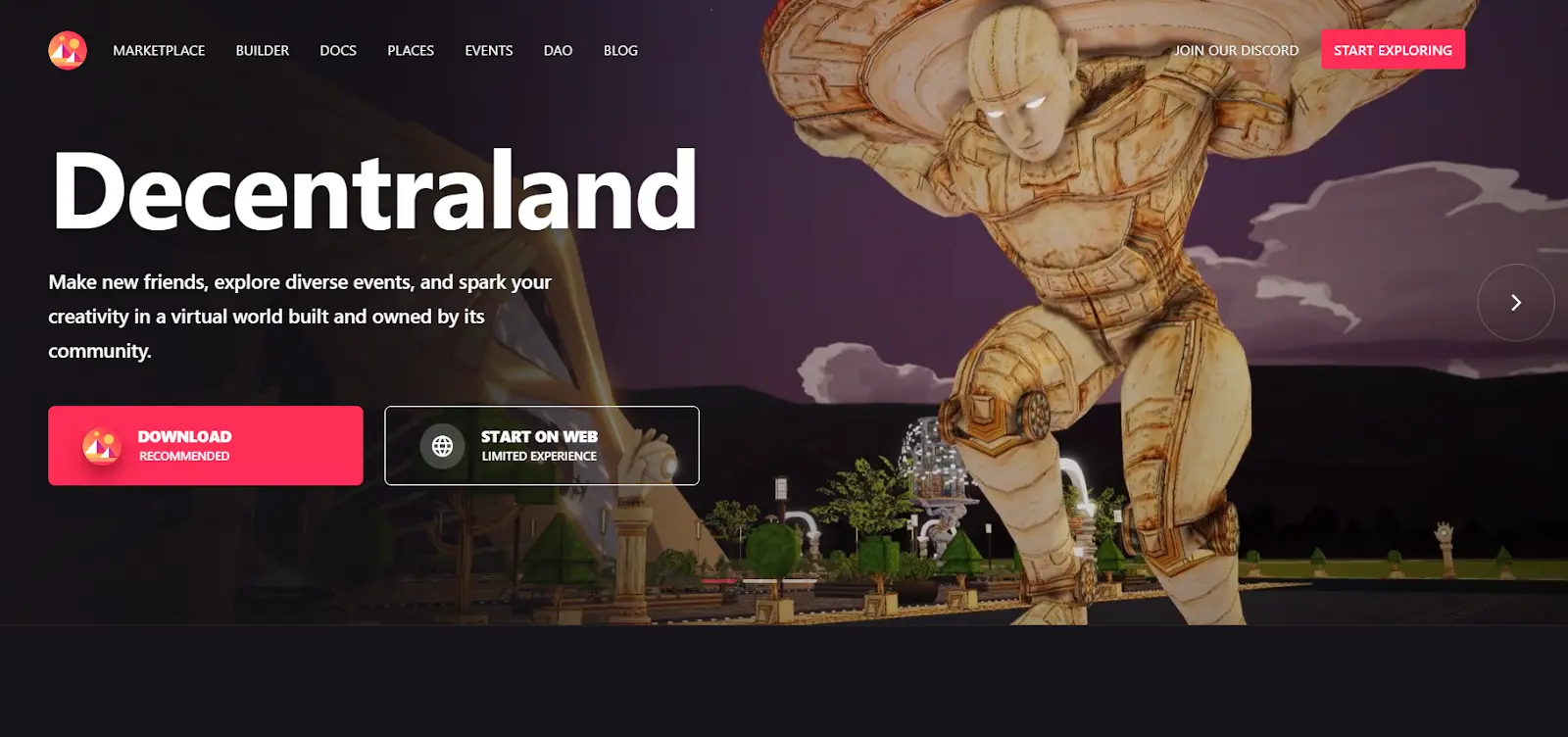
Decentraland exists on the Ethereum blockchain. As the metaverse's name suggests, it represents decentralized virtual reality in the form of a fixed 3D environment.
Every piece of land in Decentraland is an NFT, and participants use MANA, Decentraland's native ERC-20 token, to purchase these parcels. One of the biggest advantages of participating in Decentraland is the ability to monetize your apps in addition to creating and exploring other content.
Another important thing about Decentraland is that some of its users are famous brands and celebrities. The strategic purchase of well-positioned parcels allows users to obtain high-profile partnerships with these individuals and organizations.
#2. OpenSea
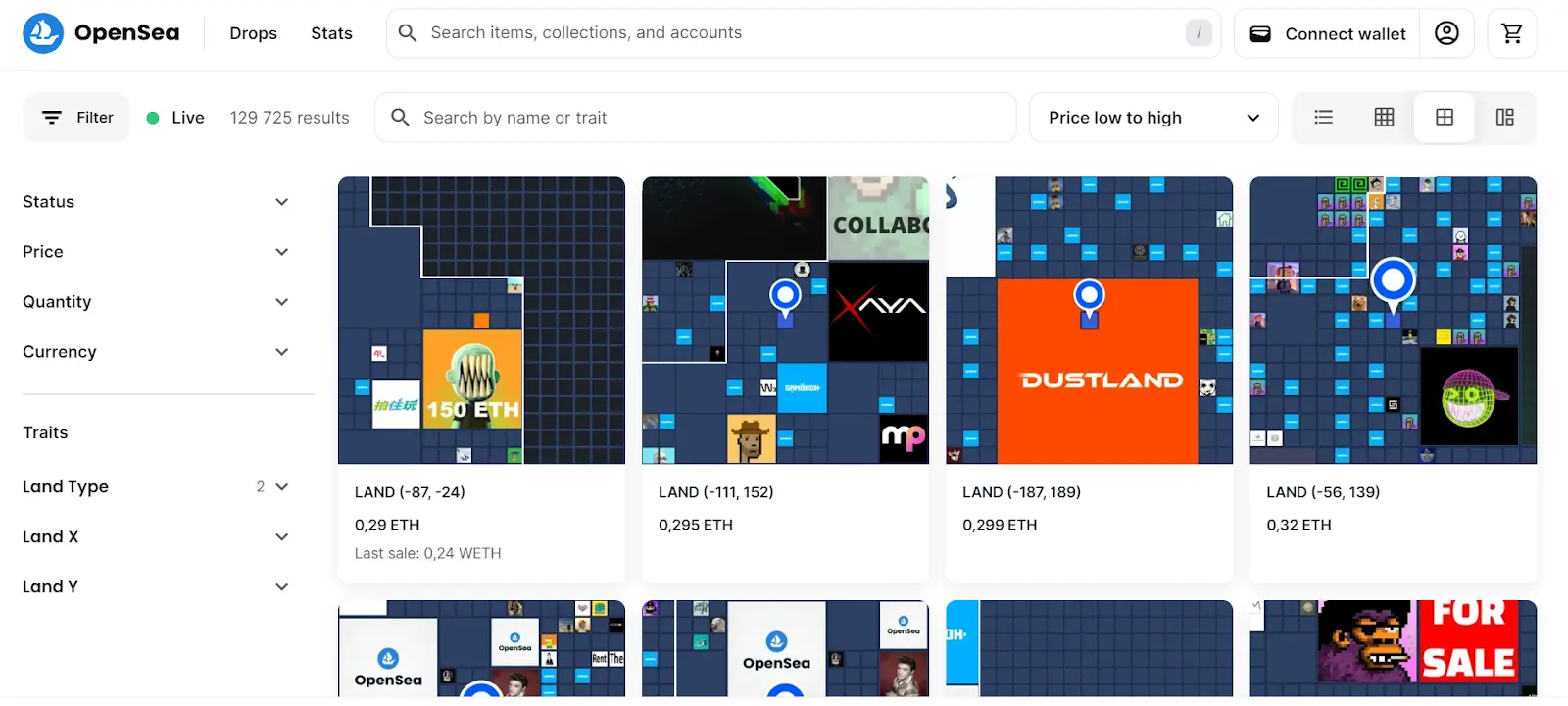
OpenSea is a decentralized marketplace primarily used for buying and selling NFTs, including metaverse real estate. It is an easy-to-use interface that connects users with the blockchain and offers valuable insights into the NFT market.
As this is an end-to-end metaverse real estate marketplace, you can purchase land from various metaverses, including Decentraland, Sandbox, and Somnium Space. In 2022, OpenSea saw a remarkable increase in trading activity, experiencing a record $3.5 billion in monthly Ethereum volume, which signals its rising popularity.
#3. The Sandbox
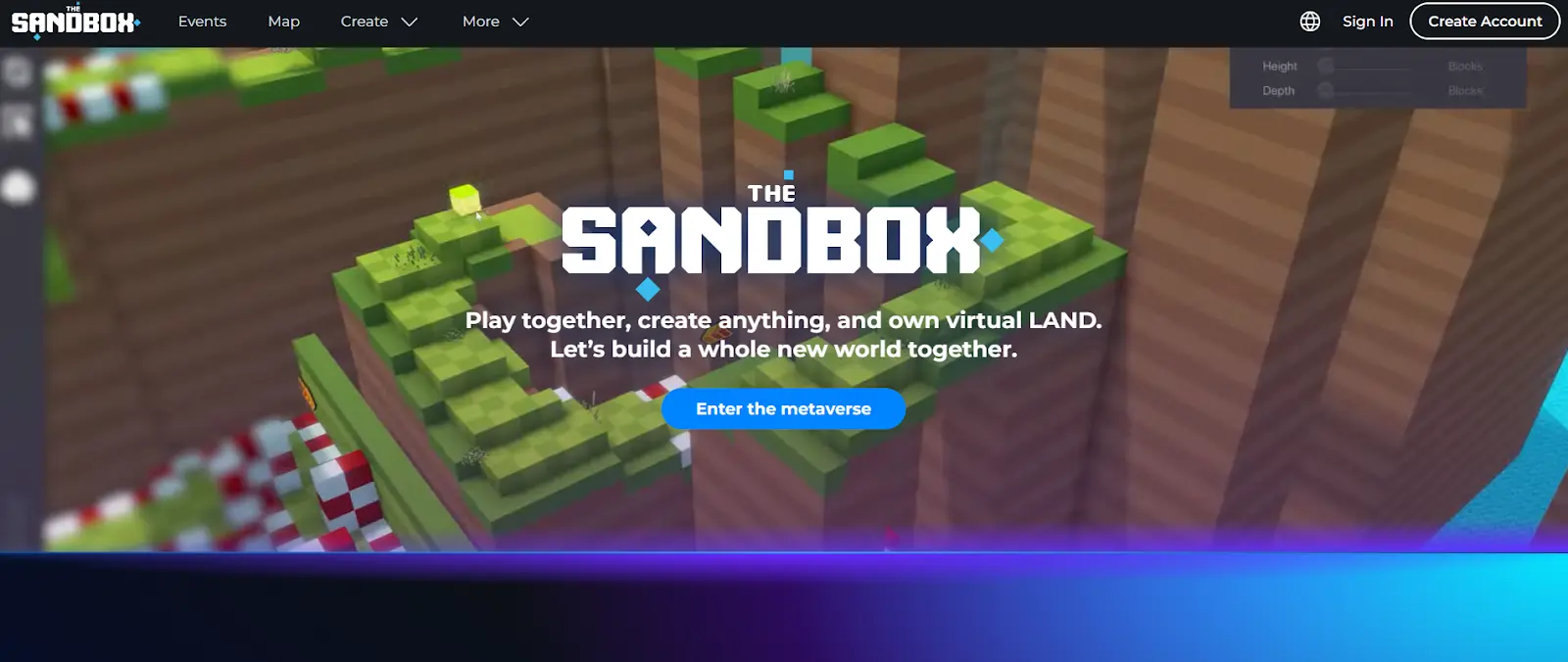
The Sandbox is another Ethereum-based metaverse focused on interaction, the purchase of virtual land, and the creation and sharing of assets. The platform saw a high-profile sale in 2021 when a metaverse real estate developer purchased land for around $4.3 million.
This metaverse aims to change the video gaming world with the use of the NFT system by allowing creators to maintain ownership over the assets they make. The land parcels, known as LANDS, can be found on the platform's own marketplace or purchased second-hand on third-party NFT exchanges like the above-mentioned OpenSea.
#4. Worldwide Webb
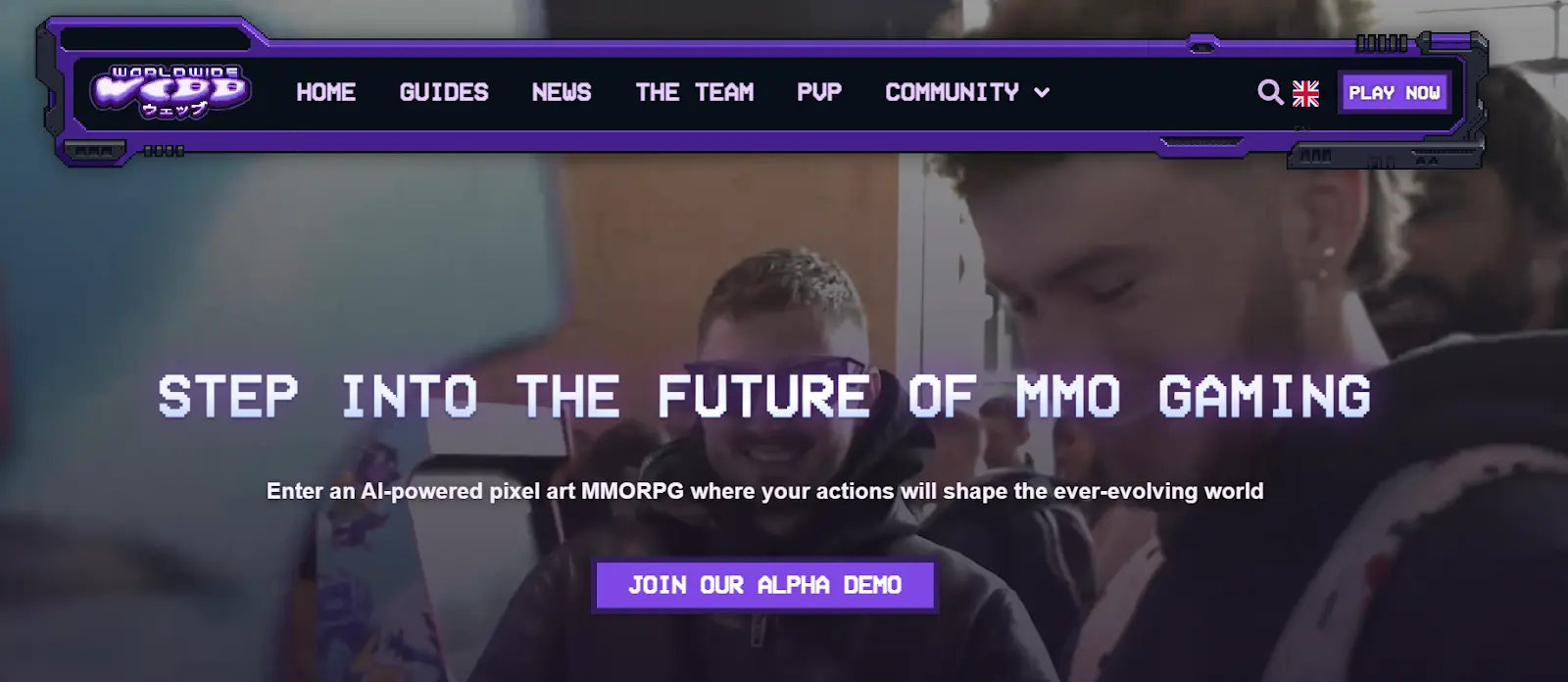
Worldwide Webb prides itself on being the crypto-based future of MMO gaming. By combining the power of AI with retro pixel art, this metaverse MMORPG recently managed to raise $10 million in funding.
Developers plan on using those funds to expand the development team. The next step is to implement a PvP system that pits teams of five players against one another in MOBA-style combat.
Another handy feature of Worldwide Webb is its support for popular NFT collections. Essentially, users can convert their Bored Apes and CryptoPunks avatars into in-game 2D pixel characters.
The long-term vision is to develop Worldwide Webb into a comprehensive universe, blending old-school aesthetics and cutting-edge blockchain technology.
#5. Somnium Space
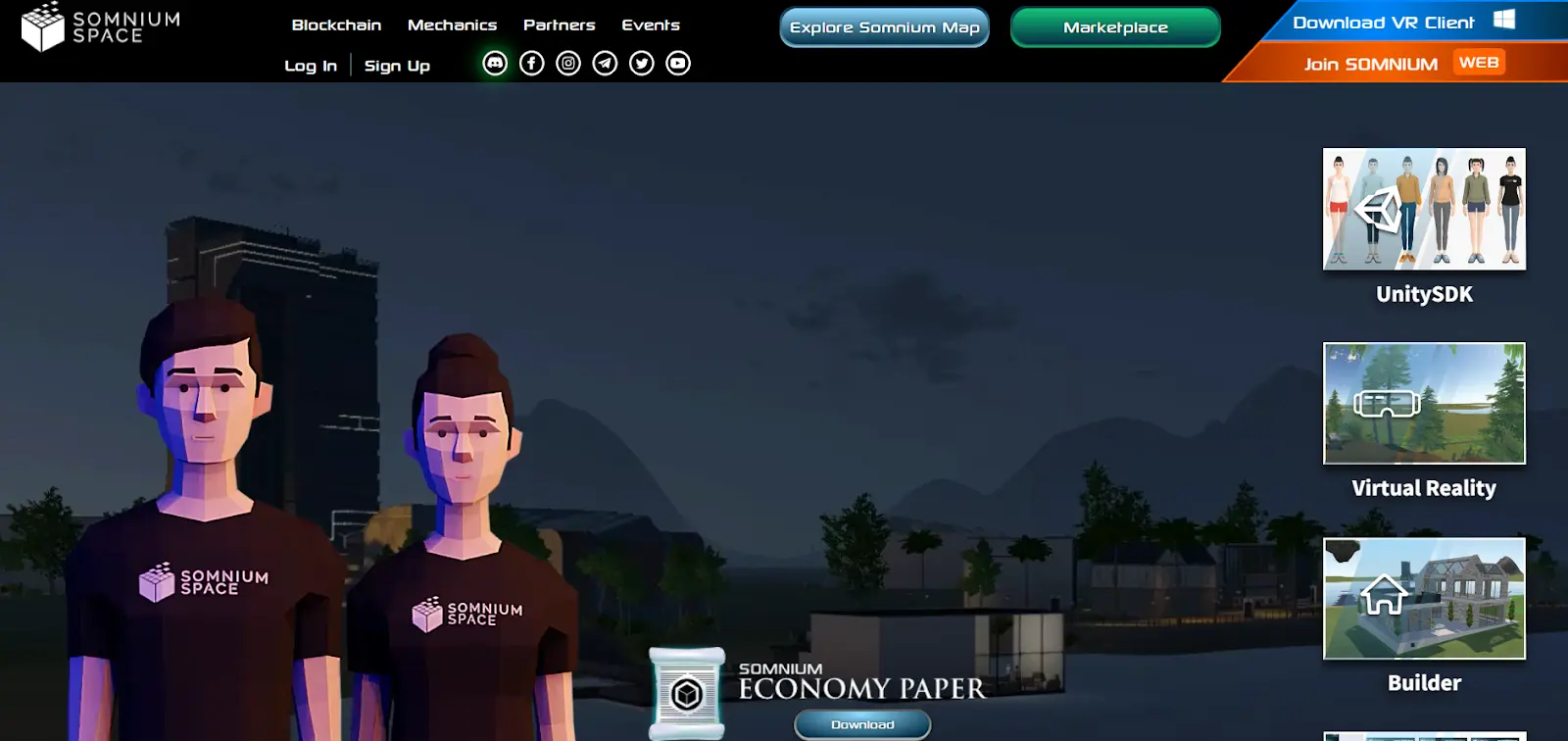
Somnium Space is an open-source metaverse platform that allows users to buy digital land, develop buildings, start businesses, play games, and organize live events. Known for its heavy focus on virtual reality, it provides a highly immersive experience to its users.
The developers plan on expanding the land of Somnium Space, allowing more users to become owners and participate in the metaverse. Meanwhile, those who want to buy parcels can do so on OpenSea using $CUBE.
Should You Buy Land in Metaverse?
Buying land in the metaverse could be a potentially profitable venture.
As the metaverse real estate market booms, each parcel of virtual land that is tradable as an NFT increases in real-world value. This is especially beneficial for early investors, who may see significant profits as virtual real estate values rise.
Ownership in the metaverse isn't just about investment; it's also an opportunity to build, exhibit game assets, and engage in unique experiences. Furthermore, ownership gives the same sense of control over a digital asset as in the real world, allowing for the creation, organization, and display of digital content.
Additionally, land investment can open avenues for business opportunities and income generation.
With Gartner predicting that by 2026, over 25% of people will spend an hour daily in the metaverse, this burgeoning sector could be a worthwhile investment. Yet, like any emerging technology, it comes with its own risks.
Is Buying Land in Metaverse Safe?
While buying land in the metaverse presents potential investment opportunities, it's essential to consider the associated risks as well.
Firstly, the volatility of the crypto market means that the value of your virtual land could drop rapidly. Also, the largely deregulated nature of this market means there are fewer channels for recourse if you encounter issues, such as fraudulent sellers.
Technical challenges, including securely storing cryptocurrencies and NFTs, add another layer of risk. Therefore, ensuring you don't lose or forget your authentication information is vital for maintaining your ownership.
Additionally, although current blockchain security measures are robust, future technologies, like quantum computing, could potentially make these measures obsolete. This especially applies to large, long-term investments.
Finally, the concept of scarcity in the virtual world differs from the real world. Virtual land is potentially limitless, and while developers do enforce artificial scarcity, there's no guarantee that this will remain the case in the future.
The Future of Metaverse Land
The future of investing in metaverse real estate is deeply intertwined with the metaverse's progression.
As influential organizations like Meta, Microsoft, and Nvidia pivot towards the metaverse, viewing it as the "next generation" of the internet, the demand for digital real estate could skyrocket.
Key industries have begun capitalizing on the metaverse's potential. For instance, the healthcare sector could leverage the metaverse for advanced telemedicine experiences, possibly even creating digital twins of body organs to aid in diagnostics and surgeries.
Similarly, the education, entertainment, and publishing industries are embracing the metaverse to offer immersive, interactive experiences. Moreover, the metaverse can revolutionize content delivery by transforming existing content and allowing for highly engaging, interactive experiences.
Given the potential widespread adoption and integration of the metaverse across multiple sectors, it appears that metaverse real estate will have a bright and dynamic future subject to constant improvement and innovation.
The bottom line is that investors should keep a close eye on these developments to seize new opportunities and understand evolving risks.
Key Takeaways
Investing in metaverse land ownership presents an exciting opportunity, particularly within blockchain gaming. However, it is a decision you need to make cautiously, considering all potential advantages and drawbacks.
The metaverse's immersive 3D interactions, powered by emerging technologies like AI, AR, and VR, can revolutionize sectors such as healthcare and education. Other businesses are also harnessing these technologies to drive their digital transformations, expanding the demand for metaverse real estate.
However, investing in virtual land carries risks, especially for novice investors. Thorough research is essential before entering the metaverse real estate market. For those hesitant to commit, free exploration of the metaverse platforms can offer valuable insights.